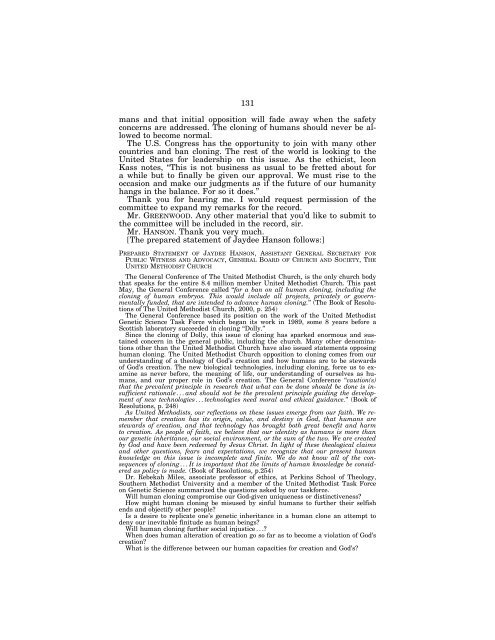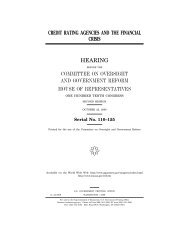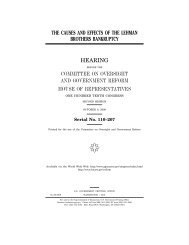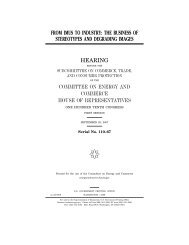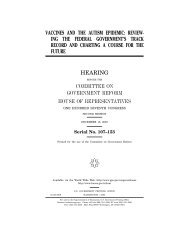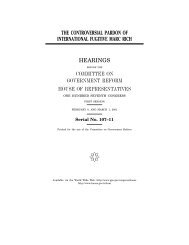ISSUES RAISED BY HUMAN CLONING RESEARCH HEARING ...
ISSUES RAISED BY HUMAN CLONING RESEARCH HEARING ...
ISSUES RAISED BY HUMAN CLONING RESEARCH HEARING ...
You also want an ePaper? Increase the reach of your titles
YUMPU automatically turns print PDFs into web optimized ePapers that Google loves.
131mans and that initial opposition will fade away when the safetyconcerns are addressed. The cloning of humans should never be allowedto become normal.The U.S. Congress has the opportunity to join with many othercountries and ban cloning. The rest of the world is looking to theUnited States for leadership on this issue. As the ethicist, leonKass notes, ‘‘This is not business as usual to be fretted about fora while but to finally be given our approval. We must rise to theoccasion and make our judgments as if the future of our humanityhangs in the balance. For so it does.’’Thank you for hearing me. I would request permission of thecommittee to expand my remarks for the record.Mr. GREENWOOD. Any other material that you’d like to submit tothe committee will be included in the record, sir.Mr. HANSON. Thank you very much.[The prepared statement of Jaydee Hanson follows:]PREPARED STATEMENT OF JAYDEE HANSON, ASSISTANT GENERAL SECRETARY FORPUBLIC WITNESS AND ADVOCACY, GENERAL BOARD OF CHURCH AND SOCIETY, THEUNITED METHODIST CHURCHThe General Conference of The United Methodist Church, is the only church bodythat speaks for the entire 8.4 million member United Methodist Church. This pastMay, the General Conference called ‘‘for a ban on all human cloning, including thecloning of human embryos. This would include all projects, privately or governmentallyfunded, that are intended to advance human cloning.’’ (The Book of Resolutionsof The United Methodist Church, 2000, p. 254)The General Conference based its position on the work of the United MethodistGenetic Science Task Force which began its work in 1989, some 8 years before aScottish laboratory succeeded in cloning ‘‘Dolly.’’Since the cloning of Dolly, this issue of cloning has sparked enormous and sustainedconcern in the general public, including the church. Many other denominationsother than the United Methodist Church have also issued statements opposinghuman cloning. The United Methodist Church opposition to cloning comes from ourunderstanding of a theology of God’s creation and how humans are to be stewardsof God’s creation. The new biological technologies, including cloning, force us to examineas never before, the meaning of life, our understanding of ourselves as humans,and our proper role in God’s creation. The General Conference ‘‘caution(s)that the prevalent principle in research that what can be done should be done is insufficientrationale...and should not be the prevalent principle guiding the developmentof new technologies...technologies need moral and ethical guidance.’’ (Book ofResolutions, p. 248)As United Methodists, our reflections on these issues emerge from our faith. We rememberthat creation has its origin, value, and destiny in God, that humans arestewards of creation, and that technology has brought both great benefit and harmto creation. As people of faith, we believe that our identity as humans is more thanour genetic inheritance, our social environment, or the sum of the two. We are createdby God and have been redeemed by Jesus Christ. In light of these theological claimsand other questions, fears and expectations, we recognize that our present humanknowledge on this issue is incomplete and finite. We do not know all of the consequencesof cloning...It is important that the limits of human knowledge be consideredas policy is made. (Book of Resolutions, p.254)Dr. Rebekah Miles, associate professor of ethics, at Perkins School of Theology,Southern Methodist University and a member of the United Methodist Task Forceon Genetic Science summarized the questions asked by our taskforce.Will human cloning compromise our God-given uniqueness or distinctiveness?How might human cloning be misused by sinful humans to further their selfishends and objectify other people?Is a desire to replicate one’s genetic inheritance in a human clone an attempt todeny our inevitable finitude as human beings?Will human cloning further social injustice...?When does human alteration of creation go so far as to become a violation of God’screation?What is the difference between our human capacities for creation and God’s?VerDate 11-MAY-2000 07:46 May 24, 2001 Jkt 000000 PO 00000 Frm 00135 Fmt 6633 Sfmt 6621 71495.TXT HCOM2 PsN: HCOM2


